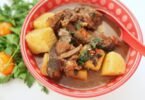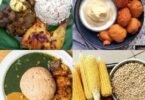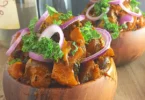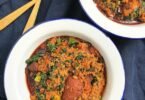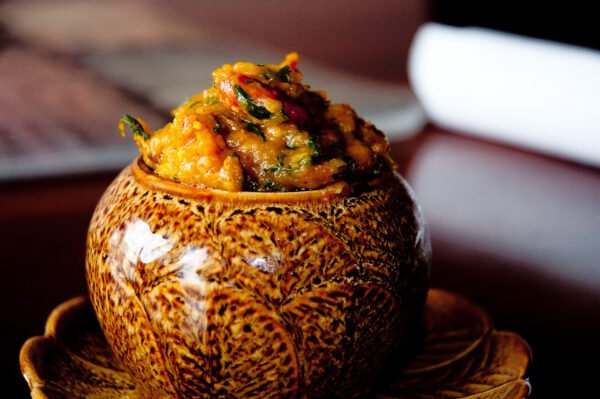
The Efik people live mainly in southeastern Nigeria, specifically in Cross River State, and are popular for their well-entrenched cultural endowment, conspicuous traditions, and especially for their cooking skills. Their food is an element of their personality that illustrates their dexterity in tapping abundant resources that seem to have continually flowed from the richness of the ground, water, and trees where they lived. Having possession of styles that incorporate ingredients into palatable and beautifully presented meals, Efik cuisine has grown popular not only in Nigeria but also internationally.
For this specific article, I will explore the various local foods eaten by the Efik people, the aesthetic, the flavour, and the value behind each delicacy.
1. Edikang Ikong
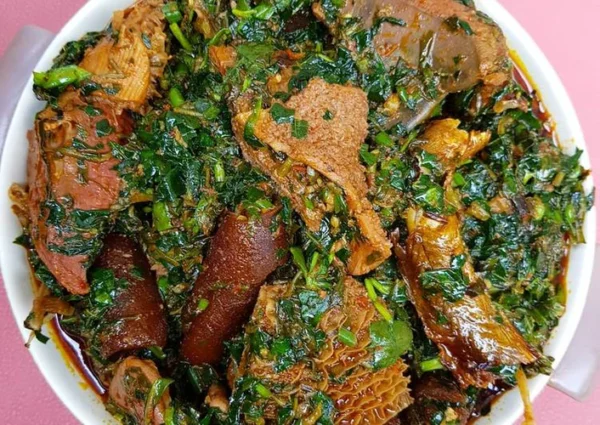
The staple of Efik food is likely Edikang Ikong which is a vegetable soup with boastful flavours and traced to be the sort of Nigerian soup most referred to as ‘the king of soups’. Historically, this dish was prepared in cases such as celebrations or feasting and sometimes for the reception of guests and consists of cooked water-leaf (Talinum triangulare), fluted pumpkin leaves (Telfairia occidentalis), meats, fish, and crayfish. Thickeners include palm oil used for colour and other seasonings such as onions, pepper, and salt are for flavouring.
Cooking of Edikang Ikong is time-consuming as it requires proper washing and cutting of vegetables and slow cooking to blend all flavours. This is usually eaten with fufu, pounded yam, or eba – foods that represent the Efik people’s commitment to using whole, unprocessed ingredients.
2. Afang Soup
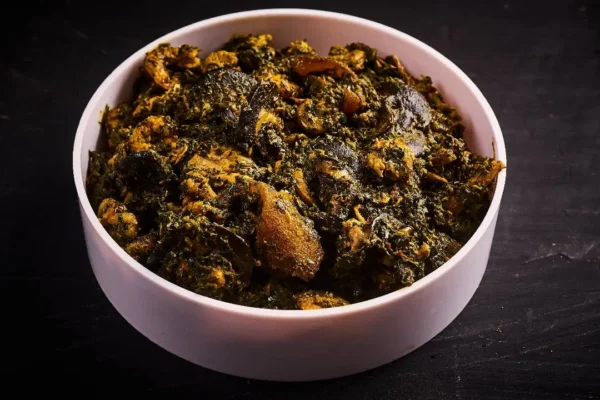
Like Edikang Ikong but different in some way, Afang Soup is another very popular Efik dish. The key difference lies in its primary vegetable: Water leaf or afang leaves, preferably Gnetum africanum, the leaves though tender are slightly harder than water leaf. It works great when combined with waterleaf and the soup’s richness that Afang leaves brought compensates for the freshness of waterleaf.
Goat meat, the African delicacies of snails, dried fish also known as stockfish, and periwinkle give the dish a somewhat royal touch. Palm oil is needed as it gives the soup a bright color and an rich taste. For best results, Afang Soup should be eaten with items like semovita, pounded yam and it is enjoyed across Nigeria with out prejudice to culture.
3. Ekpang Nkukwo
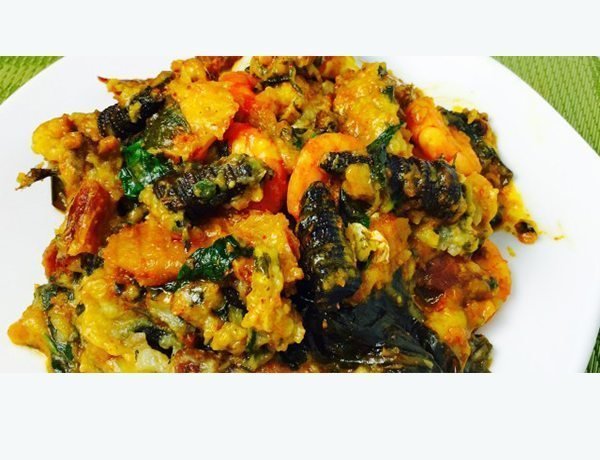
Ekpang Nkukwo is a cooked delicacy from the Efik ethnic group and relates the story of how the people made the best out of available materials. It is produced using grated cocoyam, and water yam, made in cocoyam leaves, and boiled with a concoction of water, palm oil, and condiments. Periwinkle, dried fish, and shrimp are included in this regard, which not only enhance the bodacious flavour and aroma of the food but secrete the F-value of cholesterol protein.
Preparation of this dish takes a significant amount of time length for one to prepare the yam mixture correctly and wrap them appropriately in the leaves. Even though its preparation is fairly complex, it is adored for its slightly gross flavour and is usually served during different family ceremonies.
4. Abak Atama
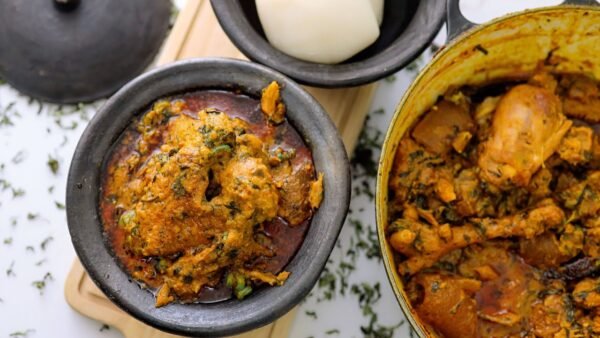
Despite this, another well-known food among the Efik people is Abak Atama – a hot soup made from palm nuts stewed with the paste made from the atama tree (Heinsia crinita) leaves. The palm fruit extract forms the bulk of this soup, and it gives it a creamy/nutty taste, while the Atama leaves are a little bitter to balance the richness of the palm fruit extract.
Other ingredients include fresh fish, smoked fish, different types of meat, ground crayfish and other local spices. Abak Atama is preferably eaten with starchy dishes such as pounded yam or white rice. This dish best illustrates how the Efik people were able to make the best out of the available ingredients in a blend of tastes.
5. Ukodo (Yam Pepper Soup)
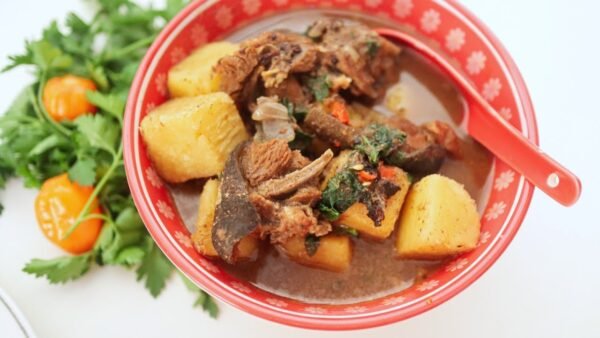
While Ukodo may be generally connected with other Nigerian ethnic groups, the Efik people have their own version of these warm plates. With yam and spicy pepper soup, UKODO is considered a meal that replicates the body of nutrients and can be taken by people who have illness, childbirth, etc.
Cumptuous yam soup has components like onions, pepper, ginger, and local spices finished with catfish, goat meat, or chicken to make it more fulfilling.
6. Editan Soup
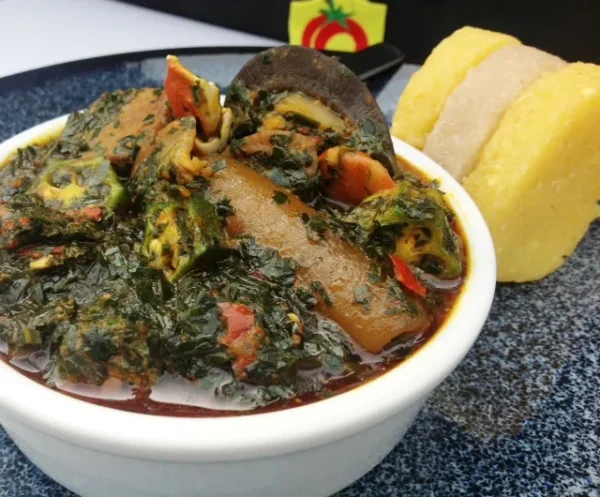
Editan Soup is a delightfully simple soup next to which others merely suggest ways of garnishing their creativity. A popular soup originating from the palm oil-producing regions, this soup is prepared with palm oil, as well as an assortment of herbs. Bold spices added to meat, including chicken, fish, or goat meat, are used to slow cook to develop a flavourful broth.
This dish is usually eaten during festivals and can always be eaten with pounded yam or eba. With Editan soup, the simplicity of the preparation does not translate to how delicious the dish tastes; this is why it is commonly seen on the tables of many Efik homes and restaurants.
7. Atama Soup
Atama Soup is related to Abak Atama, yet moving focus towards the Atama leaves. Abak Atama is made with palm fruit extract, but then it is cooked with spices and other seasonings to form this soup. Atama leaves are used in this delicacy, and I believe that they are very versatile on the Efik local food menu.
It is best eaten with fufu or pounded yam, and, given its rich, slightly acidic taste, it is a favourite among many. Atama Soup therefore remains a witness to the Efik’s attachment to the environment and how they turn our local plants into food delicacies.
8. Edesi Isip (Coconut Rice)
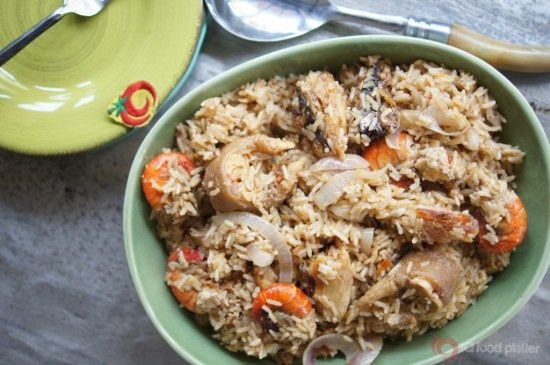
While soups dominate Efik cuisine, rice dishes like Edesi Isip demonstrate their versatility. Coconut rice is a fragrant and flavourful dish made by cooking rice in freshly extracted coconut milk. Additional ingredients like smoked fish, crayfish, and vegetables enhance the taste, while the creamy texture of the coconut milk ensures a luxurious dining experience.
Edesi Isip is often served as a standalone meal or paired with fried plantains and grilled fish. Its mild yet aromatic flavour makes it a favourite for both everyday meals and special occasions.
9. Afia Efere (White Soup)
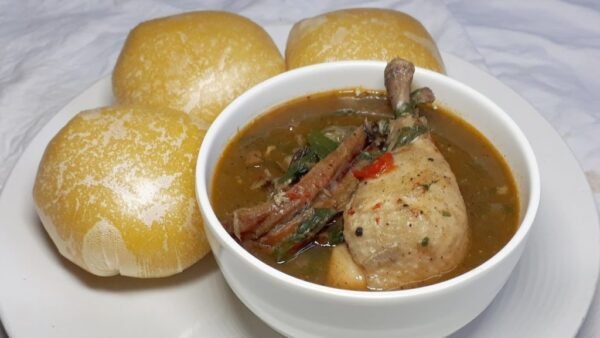
Afia Efere is a soup with a mild flavour, it does not contain any form of oil. prepared using meat or fish stock and has the Efik seasonal condiments, which include; uda (Negro pepper), utazi leaves, and ground crayfish. Mutton, goat meat, chicken, or fresh fish are added to the broth to make a tasty yet healthy meal to consume.
This soup is usually eaten with other stiff starchy foods like pounded yam or anything like fufu because the beauty of this soup lies in how simple it is prepared.
10. Ikon Mbukpa (Plantain Porridge)
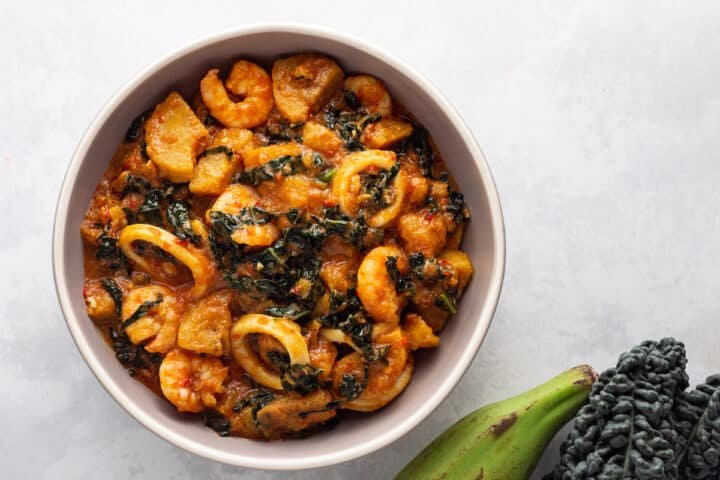
The Efik people’s fondness of plantains is rather well illustrated in Ikon Mbukpa—ripe or unripe plantain porridge. Crayfish, smoked fish, palm oil, local spices, and the food are cooked in a big pot to produce a satisfying oily dish.
It is a very yummy dish that is usually taken often by the Efik people because it is very nutritious. Truly, it is good to eat as a main dish or veggie side dish, and it is most loved for stability.
The Cultural Significance of Efik Cuisine
Efik Cuisine is not just about food; it is about identity, community, and, more importantly, tradition. Food is juicy and tasty and a lot of time is given in preparation depending on the type of food and the status of the guest most especially the Efik people hold their guests so dear they always make sure they give them a warm welcome and make them feel at home. Every meal has a story behind it, particularly in the kitchen: it may be inherited from ancestors or made to celebrate milestones in one’s life.
Apart from the taste, the consumption of any Efik food is a process that affects all five senses. Their dishes demonstrate the art of cooking, detailed in movement, colour, smell, and more in terms of the Efik cooking culture. Also important, they have an ecologically healthy diet since most of the food is grown in the region or regionally and raw organic ingredients are used in cooking.
Conclusion
Food among the Efik people includes numerous colourful local dishes from various regions, types of food preparations, and general eating habits. It will, perhaps, interest the Francophonic and other international audiences to discover that food and traditional meals such as Edikang Ikong and Afang Soup, Ekpang Nkukwo, as well as Ikon Mbukpa, mean so much more to the Efik people than just lunches, dinners, and suppers.
As more people are becoming aware of the yummy delights of Efik cuisine, more history and heritage make the dish one of the favourite Nigerian cuisines. Whether you are a first-time consumer who would like to touch the tongue of Nigerian foods or you are a sophisticated palate who wants to expand the culinary delights of Nigeria, the Efik local foods are rather tantalizing for the ears, eyes, and above all the taste buds.

